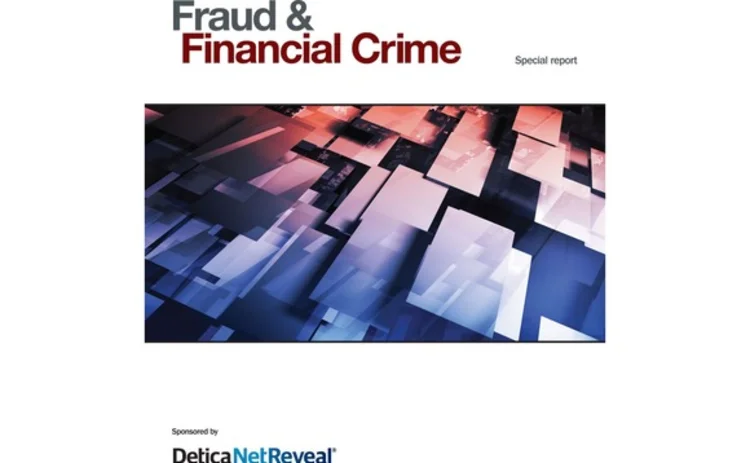
Fraud and Financial Crime special report 2011

“I trusted some very intelligent people to decide where my money should go,” remarked one comedian recently, “and, apparently, they decided that most of it should go to them.”
Fraud and financial crime generally are rarely out of the news – and there are many reasons why this is so. No economies have yet recovered fully from the financial crisis, which has now moved into a new and more dangerous stage centred on eurozone sovereign risk. Growth remains weak, unemployment is high and financial markets are still volatile. In these circumstances, banks and the individuals who work for them are under severe economic pressure – leading them, in some cases, to break the rules in search of gain. In some cases, this can mean criminal fraud for personal gain; in others it can mean perpetrating or permitting ‘rogue’ trading in search of greater returns for the institution (and, potentially, larger bonuses for the individual).
There is also a delay between perpetration and discovery – the average fraud lasts three years, implying that many of the frauds initiated around the deepest point of the recession in early 2009 have still not come to light.
This isn’t the only reason for fraud to be a growing concern. As participants in our virtual Q&A noted, the growth of online banking, and the rapid development of new types of criminal software, have led to a significant increase in the threat of online attack. Online finance also means that attacks can be completed much faster – real-time monitoring of customer activity could now involve reacting to suspicious actions in milliseconds. And the push for greater convenience has also opened the way for social engineering frauds.
Has the increase in risk led to an increase in vigilance? Not always – in fact, it’s a continuing concern that control and audit functions may be first on the chopping block when budgets need to be reduced. And, partly as a result of this, most frauds are discovered by chance or due to a tipoff – not because fraud prevention mechanisms have worked as designed. In particular, too much attention is paid to external fraud when the more common – and more dangerous – threat comes from within the organisation. Companies need to pay more attention to their employees and corporate culture to keep the new wave of fraud under control.
The results of the Operational Risk & Regulation/Detica NetReveal Financial Crime Survey 2011 will be published in the January 2012 issue of the magazine.
Click here to view the full report in PDF format.
Only users who have a paid subscription or are part of a corporate subscription are able to print or copy content.
To access these options, along with all other subscription benefits, please contact info@risk.net or view our subscription options here: http://subscriptions.risk.net/subscribe
You are currently unable to print this content. Please contact info@risk.net to find out more.
You are currently unable to copy this content. Please contact info@risk.net to find out more.
Copyright Infopro Digital Limited. All rights reserved.
As outlined in our terms and conditions, https://www.infopro-digital.com/terms-and-conditions/subscriptions/ (point 2.4), printing is limited to a single copy.
If you would like to purchase additional rights please email info@risk.net
Copyright Infopro Digital Limited. All rights reserved.
You may share this content using our article tools. As outlined in our terms and conditions, https://www.infopro-digital.com/terms-and-conditions/subscriptions/ (clause 2.4), an Authorised User may only make one copy of the materials for their own personal use. You must also comply with the restrictions in clause 2.5.
If you would like to purchase additional rights please email info@risk.net
More on Operational risk
Evalueserve tames GenAI to boost client’s cyber underwriting
Firm’s insurance client adopts machine learning to interrogate risk posed by hackers
Integrated GRC solutions 2024: market update and vendor landscape
In the face of persistent digitisation challenges and the attendant transformation in business practices, many firms have been struggling to maintain governance and business continuity
Vendor spotlight: Dixtior AML transaction monitoring solutions
This Chartis Research report considers how, by working together, financial institutions, vendors and regulators can create more effective AML systems
Financial crime and compliance50 2024
The detailed analysis for the Financial crime and compliance50 considers firms’ technological advances and strategic direction to provide a complete view of how market leaders are driving transformation in this sector
Automating regulatory compliance and reporting
Flaws in the regulation of the banking sector have been addressed initially by Basel III, implemented last year. Financial institutions can comply with capital and liquidity requirements in a natively integrated yet modular environment by utilising…
Investment banks: the future of risk control
This Risk.net survey report explores the current state of risk controls in investment banks, the challenges of effective engagement across the three lines of defence, and the opportunity to develop a more dynamic approach to first-line risk control
Op risk outlook 2022: the legal perspective
Christoph Kurth, partner of the global financial institutions leadership team at Baker McKenzie, discusses the key themes emerging from Risk.net’s Top 10 op risks 2022 survey and how financial firms can better manage and mitigate the impact of…
Emerging trends in op risk
Karen Man, partner and member of the global financial institutions leadership team at Baker McKenzie, discusses emerging op risks in the wake of the Covid‑19 pandemic, a rise in cyber attacks, concerns around conduct and culture, and the complexities of…







